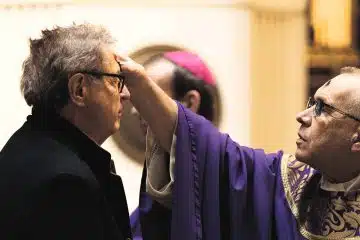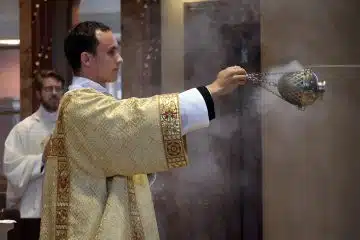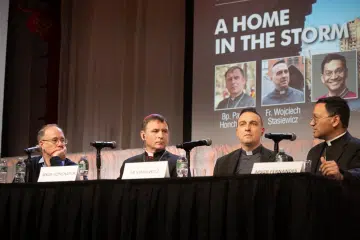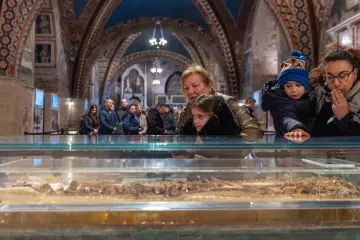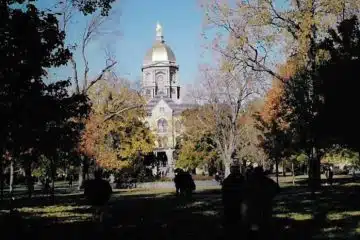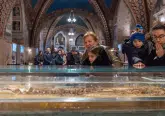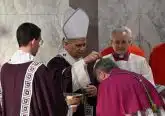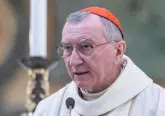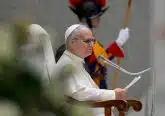Start of Pope Leo XIV’s pontificate brings surge of interest in papal blessings
Vatican City, Jul 31, 2025 / 10:41 am
The Vatican has seen a boom in requests for blessings from the new pope, with at least a 30% increase during Leo XIV’s first month reflecting enthusiasm over the start of a new pontificate — and highlighting a traditional practice that combines devotion with fundraising for charitable works.
In June, the Vatican granted 20,000 papal blessing requests — up from the 12,000 to 15,000 parchments distributed in a typical month — something that “has never happened in history,” Cardinal Konrad Krajewski told CNA in an interview this week.

The Polish cardinal, who is responsible for the Vatican’s charitable activities and the granting of blessing certificates, said when the office reopened its doors in May after the papal interregnum and Leo’s election, a line formed a 10th of a mile long, winding out the building, down the street, and almost beyond the Vatican’s Sant’Anna Gate.
The papal charities office had to close online orders for around two weeks in June because they couldn’t keep up with requests, he noted. “Everyone wanted the blessing of the new pope.”
He added that the start of the new pontificate coincided with a popular time of year to receive sacraments, including confirmation, first holy Communion, and priestly ordination, contributing to the rise in demand.
The meaning of a blessing
According to the Catechism of the Catholic Church, blessings — of people, meals, objects, and places — praise God and pray for his gifts.
“In Christ, Christians are blessed by God the Father ‘with every spiritual blessing.’ This is why the Church imparts blessings by invoking the name of Jesus, usually while making the holy sign of the cross of Christ,” the catechism says.
For Catholics, Krajewski said, the blessing of the pope can hold a special significance, since he is their spiritual father.
“We want to ask for the blessing of the pope, which we hang in our home and which helps us to live through difficult times,” he said. It helps us to know “that there is someone who bears the name of Jesus, who comes under my roof and blesses me; this is something normal, something very human.”
People can receive the pope’s blessing during an in-person encounter or now, even through social media or the television. But having his apostolic blessing on paper, hanging in their home, helps people to feel “strongly united with the pontiff, who represents Our Lord,” the cardinal said.
He likened a blessing to a mother’s kiss on her child’s hurt knee: It does not necessarily take away the pain of suffering, but the expression of the pope’s closeness can give a lot of comfort as people are trying to live the Christian life.
How a blessing gets made
Since the late 19th century, the Vatican has granted signed and stamped certificates bestowing apostolic blessings on Catholics, usually for a special occasion such as a baptism, marriage, wedding anniversary, first holy Communion, or milestone birthday.
For a period, the Vatican authorized some souvenir and bookstores close to St. Peter’s Basilica to also sell the blessings, but that practice ended in 2014, and now, the only way to request the apostolic blessing parchment is online or in person at the papal charities office in Vatican City.
While online orders of blessings must fall under one of a limited set of categories and require only a personal declaration of eligibility, Krajewski explained that people can also make in-person requests for blessings for other reasons, such as illness. In these cases, the papal charities office requires a parish priest or an apostolic nuncio (the pope’s ambassador to a country) to pronounce on the suitability of granting the blessing.
The cardinal said this was to avoid any possibility that someone might try to acquire a blessing certificate for a scandalous purpose, such as for display in a hospital where abortions are performed. The doctors at that hospital need blessings and prayers, Krajewski underlined, but an apostolic blessing on the wall, with a photo of the pope, could falsely give an impression of papal approbation.
After a request for a blessing is received, it takes between two and three weeks to process the order, to create the “parchment” (actually thick paper), and to prepare it either to be picked up or to be mailed.
Part of the preparation includes hand-lettering the certificates — for which the office employs 11 calligraphers.
Krajewski said a few of the blessing parchments are still made by request entirely in calligraphy but that most people today desire the more legible print produced by a computer. But all of the papers contain some hand-drawn elements, such as the ornate first letter of certain words.
Where the proceeds go
The Vatican charges around $23 to $35 for each blessing certificate it distributes — but clearly states that the cost is a suggested donation, and every cent of the proceeds goes directly to aid people struggling from poverty, war, or disaster.
“We say that the real blessing is the alms,” Krajewski said. “Because every [donation] obtained from the blessings goes to the poor.”
Krajewski, who was appointed papal almoner by Pope Francis in 2013, emphasized the enormous help donations for blessings make to the charitable works his office carries out. He declined to provide exact figures, but said in 2024, most of the $8 million that his office spent on aid around the world came from the blessings.
“We are Pope Leo’s first aid,” he said. “When something happens in the world [we are the] first aid … the ambulance that runs to help.”
A recent project financed by the donations, he said, was support for those affected by the typhoon in Taiwan. Through the apostolic nuncio the Vatican is able to send money to a country in need sometimes in a matter of hours.
“The Holy Father reminds us that it is not enough to say ‘I’m sorry,’ ‘I’m united with you,’ but [we need to also] send concrete aid.”
Another recent gift from the Vatican’s charitable arm was a bread oven for the war-torn city of Kharkiv, Ukraine. Throughout the war, the Vatican has given food, medical aid, and even cash to people struggling in Ukraine, often delivered in a truck driven by the 61-year-old Krajewski himself.
“Pope Francis once told me if this money does not go to the poor, I will end up in hell,” the cardinal said. “Pope Francis was very, very direct. And then, he would always ask if our bank account was empty, because if our bank account was empty, it meant that we had helped a lot of people.”
“But the blessings help us to be sure of having resources to help and this is a beautiful thing,” he added.



